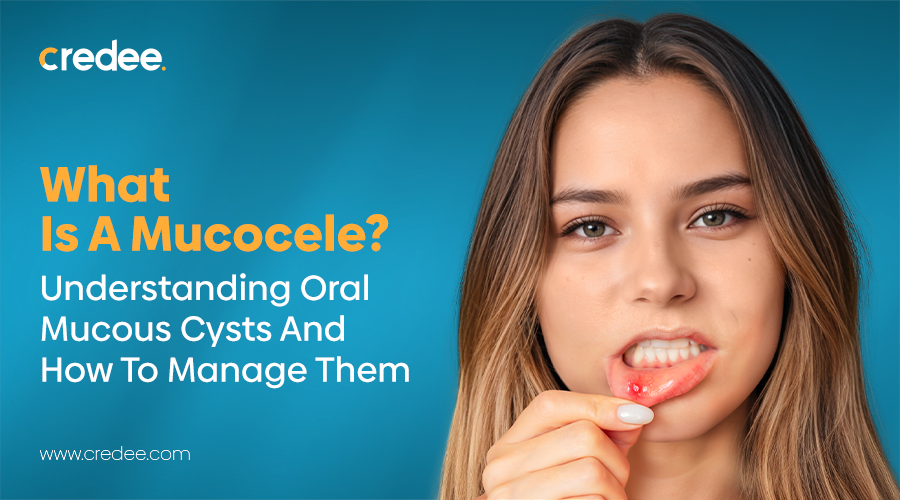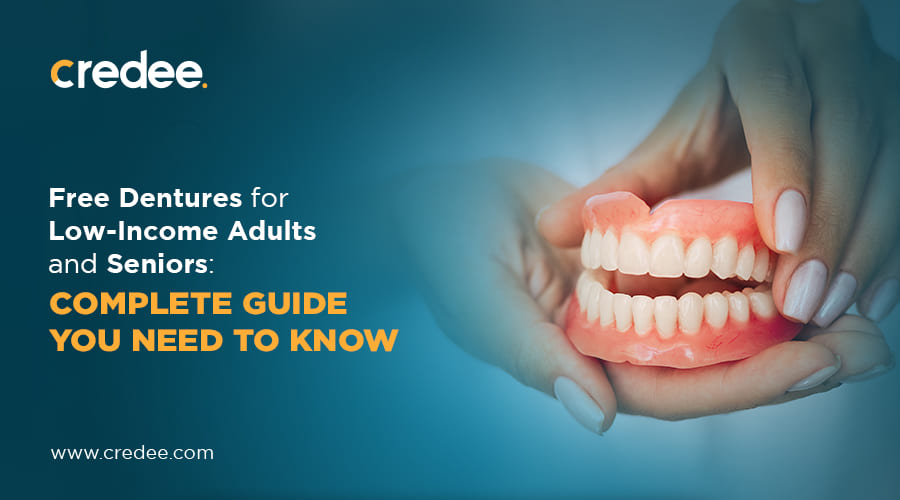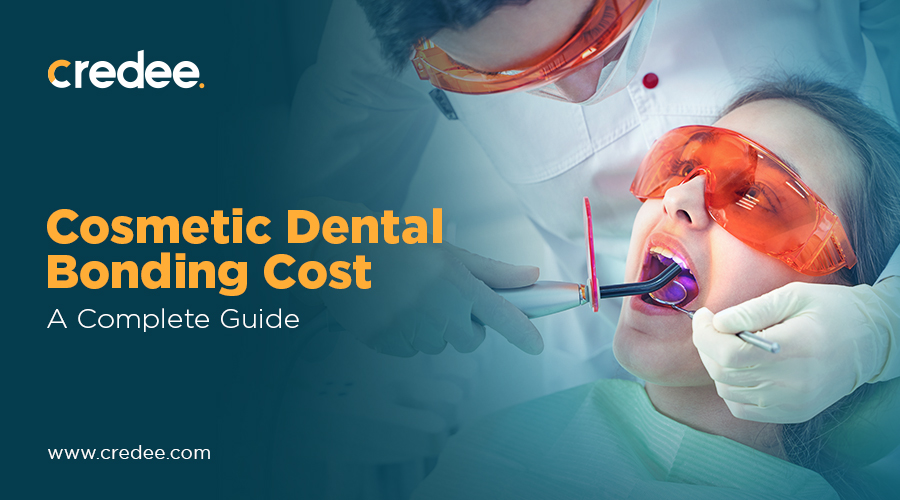
You’re halfway through a bag of chips when you accidentally bite your lip hard. A few days later, you notice a weird bump inside your lip. It doesn’t hurt, but it’s definitely not going away either. Sound familiar?
That strange little bump might be an oral mucocele, also known as a mucous cyst or mucous retention cyst.
What Is a Mucocele?
Ever noticed a small, jelly-like bump inside your lip or on the inside of your cheek? That might be a mucocele, also known as an oral mucous cyst, or a mucous cyst lip.
So, what is a mucous cyst exactly? It’s a harmless, fluid-filled sac that usually forms when a salivary gland gets blocked or injured. Instead of saliva flowing out like it should, it builds up under the surface and creates a soft, often translucent bump. According to IOJHD, 82% of these lesions are found on the lower lip.
The good news? Mucoceles are generally harmless and nothing worrisome. They might feel weird, especially if they grow or get in the way while eating or speaking, but they’re usually more annoying than dangerous.
In most cases, they go away on their own, but if they’re persistent or keep coming back, a quick trip to the dentist or oral surgeon can help you get it checked or removed safely.
So, while they may look a little strange, mucoceles are just a minor hiccup in your mouth’s natural flow, nothing to panic about!
| Did You Know? Mucoceles tend to occur more often in younger individuals, with roughly two-thirds of cases appearing in people under 30. Source: National Library of Medicine |
What Causes Oral Mucocele (aka Mucous Cyst)?
If you’ve ever caught yourself biting your lip out of stress or accidentally chomped down while eating, that could be part of the problem.
So, what causes an oral mucocele, or what causes a mucous cyst? It usually boils down to one main issue: something disrupting the normal flow of saliva. Here are the usual suspects:
1. Trauma (like lip biting or cheek chewing)
This is one of the most common triggers. When you accidentally bite your lip or cheek, whether from stress, nervous habits, or just a clumsy snack, it can damage a minor salivary gland. That injury blocks the gland’s opening, trapping mucus under the surface and forming a cyst.
2. Blocked Salivary Glands
Sometimes, the duct that carries saliva out gets blocked, either due to inflammation, thick mucus, or even tiny debris. When saliva has nowhere to go, it builds up and forms a bubble-like cyst under the skin.
3. Ongoing Irritation
Frequent lip licking, poorly fitting dentures, or wearing braces can irritate and increase the chances of developing mucoceles. The constant friction messes with the salivary flow and can lead to cysts over time.
Oral Mucocele Symptoms
Here’s what you might notice:
- A clear bump inside the lip that feels squishy
- The bump may be clear, bluish, or slightly pink
- A clear bubble inside the lip that decreases in size, ruptures, or reappears
- Less commonly, a mucocele on the roof of the mouth, which might feel like a smooth lump and can interfere with eating or speaking
- In some cases, it may feel tender or get irritated if you accidentally bite it
Is an Oral Mucocele a Sign of Something Serious? Let’s Clear It Up
Finding a bump in your mouth can be concerning. But before you panic, here’s the truth: oral mucoceles are usually harmless.
They’re fluid-filled sacs that form when a salivary gland gets blocked, often due to lip biting, cheek chewing, or trauma. In most cases, they clear up on their own or with minimal treatment.
Is an Oral Mucocele Cancer?
This is a common worry, but rest easy, most mucoceles are not cancerous. They’re considered benign (non-cancerous), especially when they’re small, soft, and painless.
However, if a bump sticks around for weeks, changes shape, or becomes painful, it's worth getting checked. Rarely, a persistent lesion could be something more serious, so it's always better to be cautious and consult a dentist or oral health professional.
Is Oral Mucocele an STD? Busted: The Big Misconception
One of the biggest myths out there is the belief that oral mucoceles are sexually transmitted. Let’s be clear: an oral mucocele is not an STD. It’s not caused by any kind of infection, just blocked or damaged salivary glands. So there’s no need to worry about transmission or stigma.
| When to See a Doctor? - It doesn’t go away after 2–3 weeks - It keeps coming back - It interferes with eating or speaking - It becomes painful or bleeds |
Oral Mucocele Treatments
Here’s the truth: oral mucocele treatment often starts with doing nothing. If it’s small, not painful, and not messing with your ability to eat or speak, just leave it alone. These cysts shrink and disappear over time without any treatment.
But if that bump just won’t quit or keeps making surprise comebacks, your dentist might recommend getting it removed—usually with a quick laser treatment or a tiny surgical procedure. Worried about the cost? Totally get it. Luckily, a lot of clinics offer flexible payment plans through platforms like Credee, so you can move forward with treatment now and pay it off in a way that works for you.
Oral Mucocele Supportive Therapy You Can Do at Home
If it’s hanging around or feels a bit annoying, you can try some oral mucositis supportive therapy at home. Think of it as giving your body a little backup:
- Saltwater rinses – Helps keep the area clean and inflammation down
- Cold compresses – Reduce swelling and soothe irritation
- Avoid spicy or crunchy foods as these can irritate the cyst
- No squeezing or popping – Seriously, don’t try it
When Is Mucocele Removal Needed?
Still dealing with it after a few weeks? Constantly recurring? A dentist or oral surgeon might suggest:
- Steroid shots to shrink it
- Laser treatment to remove it quickly
- Surgical removal for stubborn or recurring ones
- Cryotherapy (freezing it off), though less common
| How to Prevent Oral Mucoceles Oral mucoceles are common, but a few simple habits can help keep them away: - Ditch the lip biting. It’s one of the main causes — try to stay mindful. - Eat with care. Chew slowly to avoid biting your lip or cheek by accident. - Stay hydrated. Dry mouth can block salivary glands, so drink plenty of water. - Keep your mouth clean. Brush, floss, and rinse daily to support gland health. - Use lip balm. Prevent cracks and dryness that make lips more vulnerable. - Check your dental appliances. Ill-fitting braces or rough teeth can irritate. - Hands off! Never try to pop a bump — let a dentist handle it if needed. |
Conclusion
So, here’s the deal, oral mucoceles are super common and usually nothing to stress about. Most of the time, they go away on their own and don’t cause any real trouble.
But if that bump doesn’t disappear, keeps coming back, or just feels off, don’t play guessing games with your health. A quick visit to your dentist can clear things up and help you feel more at ease.
Because even if it turns out to be no big deal, getting a proper diagnosis means peace of mind, and that’s always worth it.
FAQs
1. Can an Early Stage Oral Mucocele Turn Into Cancer?
Honestly, not likely. Mucoceles are usually harmless and show up when a salivary gland gets blocked. But if the bump looks weird, keeps growing, or just doesn’t go away, it’s smart to get it checked out.
2. How Long Does a Mucous Cyst Last?
Usually, these little bumps fade on their own in a couple of weeks. But if yours sticks around for too long or keeps making a comeback, it’s probably time to book a quick visit with your dentist.
3. How Do You Get Rid of a Mucous Retention Cyst?
While saltwater rinses can help in the short term, dentists have tools like lasers or minor procedures to safely remove it.
4. What Is a Mucocele Lip, and Should I Worry?
It’s that squishy bump that usually shows up after you bite your lip. It’s called a mucocele lip, and it’s not usually a big deal. But if it doesn’t go away or starts to bug you, get it checked just to be sure.
5. What Can I Do About a Mucous Cyst on My Lip?
First rule: hands off. Don’t pop it or poke it. Stick to soft foods, rinse with salt water, and try not to irritate it. If it’s still there after a couple of weeks, let a professional handle it.
6. Mucous Cyst, How to Get Rid of It Fast?
Want it gone quickly? The fastest (and safest) route is letting a dentist remove it, usually with a laser or a quick snip.
7. What Causes Mucous Cyst?
They usually happen after biting your lip or cheek (we’ve all done it) or if a salivary duct gets blocked. Constant irritation or trauma can trigger them, too. Avoiding rough chewing and being gentle with your mouth can help keep them away.
Get the Treatment You Need, Without Financial Stress.
Explore flexible payment plans with Credee now.
Schedule A Demo





